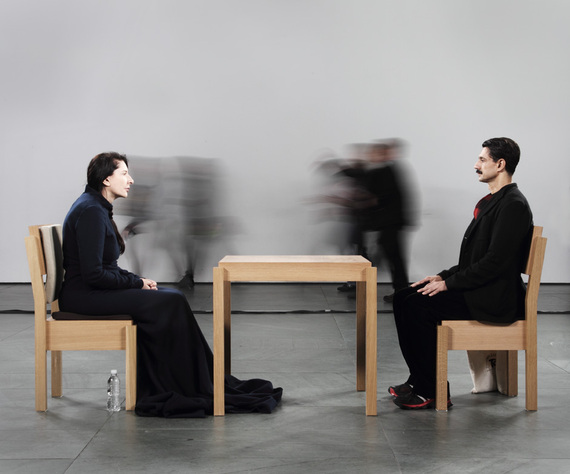In 2010, performance artist Marina Abramovic sat by herself in a MoMA exhibit. One by one, museum visitors sat in the only other chair in the room facing the artist. No one was allowed to speak, as Abramovic's installation centered on the simple though often overlooked connection made solely through eye contact. Some visitors sat for minutes. Others sat for hours. Some laughed. Others cried. Over the three months of her performance, 1,400 visitors sat in the chair, and each person experienced something notably different than their typical days. Abramovic's story has now been told in a documentary film, The Artist is Present.
Though her performance piece reveals much about human nature, to me it reveals a startling truth we seldom want to admit: humanity craves connection.
But if we crave connection so deeply, why are we often so poor at it?
Becoming Aware of Your Awareness
Awareness by itself is an abstract word, so let's break it down into three areas: our bodies, our minds, and our emotions. I think this is a fantastic way for anyone to wrap his or her mind around what it means to become a person of awareness. When we learn to become aware of these three central aspects of our existence, we will increase our connection with others.
• Learning to become aware of your body means noticing your physical reactions to situations. Does your chest tighten? Do you feel butterflies in your stomach? These are physical signs that something is upsetting you. Noticing your physical reactions in the moment is often the easiest way to increase your awareness.
• Becoming aware of your thoughts can be much more challenging. When in conversation with someone else, how often do you think about the past or the future instead of focusing on what's being said right at that moment? How often do such thoughts create unnecessary tension in your relationships?
• Lastly, becoming aware of your emotions -- especially in heated moments -- may be the most demanding area of awareness. Of course, we may easily be able to say we're angry, but knowing the actual root cause of that anger can prove to be difficult. It's also challenging for many adults to be able to name their emotions and to become vulnerable enough to share those feelings with other people.
Once we learn how to become more aware of our bodies, our minds, and our emotions -- especially in the moment -- the more likely will our connection with other people increase and deepen.
I go into detail about each of these zones in my book, but for now, let's look at how you can increase your awareness when it comes to your thoughts.
One Simple Way to Always Increase Your Self-Awareness
In my practice, I often use the phrase "showing up." It means that I'd like my clients to learn how to put away their fantasies in the moment in order to concentrate on the person to whom they're speaking. Instead of thinking about their response to whatever the other person may be saying while that person is still talking, I suggest that my clients ought to table their own internal monologues so they can better focus on what the other person is actually saying. In other words, they have to become aware of their minds.
Because of The Stories We Tell Ourselves, we all tend to do this quite often. We don't fully "show up" to our relationships and we let self-created fictional versions of other people assume control over our thoughts and actions. When we live in our heads and choose to relate to these made-up people instead of relating to the person in front of us, we run a high risk of misunderstanding the other person, consequently causing ourselves stress and adding unnecessary anxiety to the relationship. That can easily happen when we choose not to show up.
"Showing up" also means learning to assess our internal and external responses to different situations. Over time, we can learn what our "tells" are. In other words, we can know whether or not we're truly connecting with another person based on our own physical or emotional state. What emotions do you feel as they share? What physical symptoms are you experiencing? Are you sweating, laughing, nervous, or excited? Is your heartbeat calm or steadily rising? What tone of voice are you using? Do you feel understood?
In becoming aware of your own responses, you can begin to understand whether or not you're truly "showing up" to a relationship. Continue to show up and you will receive what you crave: real connection.
Which of the three zones of awareness (body, mind, emotions) do you need to become more aware of?
How can you start enacting that awareness in your daily life?
For more on this topic, pick up a copy my book The Stories We Tell Ourselves. Send an email to Scott with questions or comments: info@rscottgornto.com
If you would like to Ask Scott a question, please head over to www.rscottgornto.com.
